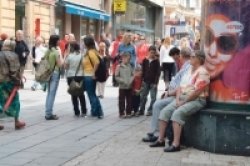
Nezavisne novine: More than a million of citizens of BiH are currently poor, and situation will be even worse because of the announcement that around 50.000 people will be left without job by the end of the year.
This has been said yesterday by Hajrudin Šahić, chairman of the Management board of the humanitarian organizations (HKO) in BiH, after the international conference on poorness and social segregation in BiH.
Exemptions from VAT
During yesterday’s conference, there have also been adopted several conclusions, which should contribute to the combat against poorness and social segregation in BiH. One of conclusions is the adoption of Law on Humanitarian Organizations, which would regulate their legal status. There has also been proposed the adoption of the law on voluntary work, change of the law on lotteries, exempting humanitarian projects and organizations from paying VAT, as well as establishing of the office for cooperation with non-governmental organizations. There has been agreed that it is necessary to establish the humanitarian network of BiH, and ensure the selection of education for children, or make the education equally available for all categories of poorness.
"According to the official data, at the end of 2008 there have been almost 800.000 poor citizens in BiH. According to the HKO data and by considering the current crisis, there are now more than a million of such citizens. Only in 'Merhamet' public kitchens, 10.550 citizens are feeding themselves every day, and 3.500 of them are on the waiting list because we are not able to offer them one meal per day", Šahić has said.
Representatives of HKO have warned that because of the poorness, children have mostly been endangered, because of which their education has been disabled. They have pointed out that the most critical situation is in the rural regions around the Zeničko-dobojski canton.
"We do not have the data on how many children in the FBiH cannot attend the elementary school because of the poorness. In the RS, 150 children have gave up the school because their parents are not able to provide them with it", Šahić has said, by adding that the governments are not capable, nor they have wishes to deal with this problem.
At yesterday’s conference, besides the representatives of four humanitarian organizations from BiH, there were also present Ernie Gillen, chairman of "Karitas" of Europe, and Zoran Šućur, professor at the Law Faculty in Zagreb.
Šućur has said that BiH does not belong to the countries with a high rate of poorness.
"That category relates to Albania, Kosovo, and Romania. In some of these countries even a half of the citizenship is poor. BiH is in the second category, but if there is no care for the poor ones, it is threatened to become one of those from the first category as well", Šućur has said. Boris Kožemjakin from the humanitarian organization "La benevolencija" says that the program of combat against the poorness in BiH must firstly be directed towards unemployed and those, who are not work-attractive due to their age or education, and children.
Gillen has concluded that he is surprised by the fact that political parties did not show the interest to deal with the problem of poorness. He has said that Europe will mark 2010 as a year of combat against poorness and he expects that BiH will become a part of that event as well. From the representatives of domestic government institutions, conference was attended by Sadeta Škaljić from the Ministry of Justice of BiH and Mirsad Kebo, deputy chairman of the FBiH, who has also received a brevet for humanity.
